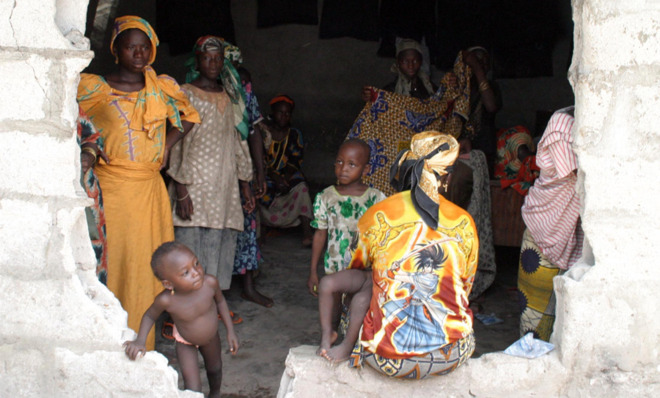The heartbreaking resilience of human trafficking
How do you fight an illicit network that thrives in the shadow of government?

A free daily email with the biggest news stories of the day – and the best features from TheWeek.com
You are now subscribed
Your newsletter sign-up was successful
For Nigeria's traffickers, it takes a megacity.
Premium Times, a Nigerian news site, recently published an arresting investigation of a local human trafficking network in Lagos, the country's commercial capital. Like too many others, the Lagos network is a protracted, ugly human tragedy. Tobore Ovuorie, a health journalist who spent four months undercover before writing the story, describes close sources who, forcibly kept from using protection during sex, acquired an assortment of infectious diseases. Given new aliases by their authoritarian pimps, young women become anonymous, indistinguishable to their "clients."
The massive complicity of the city's elites is equally jarring. "Immigration, customs, police, army and even foreign embassies are part of our network," admits one of Ovuorie's madams. In every scene, the madam's web grows: local police, international businessmen and diplomats, and hotel servicemen. When senior army officials retire, a madam's "products" seem to be an unofficial cornerstone of their pension package.
The Week
Escape your echo chamber. Get the facts behind the news, plus analysis from multiple perspectives.

Sign up for The Week's Free Newsletters
From our morning news briefing to a weekly Good News Newsletter, get the best of The Week delivered directly to your inbox.
From our morning news briefing to a weekly Good News Newsletter, get the best of The Week delivered directly to your inbox.
Since the turn of the millennium, an international advocacy community has emerged to combat the abuses Ovuorie describes. At first, the movement against human trafficking grew slowly; in 2010, Nicholas Kristof, the New York Times columnist who often champions anti-trafficking issues, wrote, "human trafficking tends to get ignored." Four years later, that notion is unrecognizable. In July, Google Ideas, the tech giant's "think/do tank," teamed up with three advocacy groups to scale an anti-trafficking hotline, and anti-trafficking policy features prominently on the Obama administration's human rights agenda. In the United States and elsewhere, national task forces assist local police with the discovery, arrest, and prosecution of trafficking networks, large and small.
Despite public attention, the dividends of anti-trafficking advocacy are unclear. More and more countries criminalize trafficking, but these new laws have led to relatively few convictions, according to the UN Office on Drugs and Crime, the international agency that monitors global trafficking trends. Anti-trafficking campaigners attribute these results to insufficient resources. To disrupt trafficking networks, campaigners caution, national and local law enforcement need more staff, better technology, and better intelligence.
This may be the case. Defending human rights is a resource-poor practice, and anti-trafficking efforts are no exception. The results gap, however, may have as much to do with how we think about trafficking as with the resources we invest to combat it.
Anti-trafficking policymakers increasingly refer to traffickers as an "illicit network," an entity that thrives in the criminal shadow of a society's formal institutions. At its best, an illicit network is a remora, picking up the scraps of an already-broken host. At its worst, the network becomes a parasite, drawing resources and, when persons are trafficked, life away from a vibrant society. In a global era, these networks often scale alongside their formal counterparts: For traffickers, "drug hub" is a synonym of "global shipping center." When police enforce anti-trafficking laws, they break these networks to assert the state's control over the rules of commerce.
A free daily email with the biggest news stories of the day – and the best features from TheWeek.com
In the United States, the state — federal, regional, and local institutions — aggressively severs the formal economy from its criminal underbelly; or, at the very least, they sever a certain type of commerce from a certain type of crime. Where the state is weaker and economic exchange less formal, as in Nigeria, the barrier between "licit" and "illicit" actions fades. The law exploits many more than it relieves: Policemen and jurists and public defenders, fixtures of a licit Lagos, also sustain the illicit economy of its madams.
There are some glimmers of hope, though. In many trafficking zones, local initiatives work to empower survivors — to restore their livelihoods, assist their mental health, and reintegrate them into their communities. The finalists of the recent Partnership for Freedom, a U.S.-based public-private partnership, convey the diversity of these initiatives: a mental health clinic in Massachusetts, a resettlement initiative in the greater Baltimore area. Elsewhere, groups like the Women’s Consortium of Nigeria offer female trafficking survivors in Lagos similarly comprehensive support.
Even amid these positive developments, however, trafficking networks will likely remain. They are more than the sum of their participants, creating a resilient economy that thrives despite the disappearance of traffickers, the prosecution of johns, the suffering of victims. That is Ovuorie's tragedy — for traffickers, everyone is dispensable.
Daniel Solomon is a writer and consultant based in Washington, DC. He blogs at Securing Rights.
-
 The ‘ravenous’ demand for Cornish minerals
The ‘ravenous’ demand for Cornish mineralsUnder the Radar Growing need for critical minerals to power tech has intensified ‘appetite’ for lithium, which could be a ‘huge boon’ for local economy
-
 Why are election experts taking Trump’s midterm threats seriously?
Why are election experts taking Trump’s midterm threats seriously?IN THE SPOTLIGHT As the president muses about polling place deployments and a centralized electoral system aimed at one-party control, lawmakers are taking this administration at its word
-
 ‘Restaurateurs have become millionaires’
‘Restaurateurs have become millionaires’Instant Opinion Opinion, comment and editorials of the day